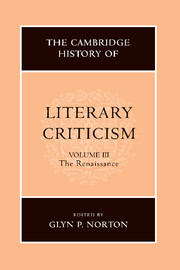Book contents
- Frontmatter
- Introduction
- READING AND INTERPRETATION: AN EMERGING DISCOURSE OF POETICS
- POETICS
- I Humanist classifications
- II The rediscovery and transmission of materials
- III Rhetorical poetics
- 13 Humanist education
- 14 Second rhetoric and the grands rhétoriqueurs
- 15 The rhetoric of presence: art, literature, and illusion
- 16 The paradoxical sisterhood: ‘ut pictura poesis’
- 17 Conceptions of style
- 18 Sir Philip Sidney's An apology for poetry
- 19 Aristotle, Horace, and Longinus: the conception of reader response
- IV Literary forms
- THEORIES OF PROSE FICTION
- CONTEXTS OF CRITICISM: METROPOLITAN CULTURE AND SOCIO-LITERARY ENVIRONMENTS
- VOICES OF DISSENT
- STRUCTURES OF THOUGHT
- NEOCLASSICAL ISSUES: BEAUTY, JUDGEMENT, PERSUASION, POLEMICS
- A SURVEY OF NATIONAL DEVELOPMENTS
- Bibliography
- Index
- References
18 - Sir Philip Sidney's An apology for poetry
from III - Rhetorical poetics
Published online by Cambridge University Press: 28 March 2008
- Frontmatter
- Introduction
- READING AND INTERPRETATION: AN EMERGING DISCOURSE OF POETICS
- POETICS
- I Humanist classifications
- II The rediscovery and transmission of materials
- III Rhetorical poetics
- 13 Humanist education
- 14 Second rhetoric and the grands rhétoriqueurs
- 15 The rhetoric of presence: art, literature, and illusion
- 16 The paradoxical sisterhood: ‘ut pictura poesis’
- 17 Conceptions of style
- 18 Sir Philip Sidney's An apology for poetry
- 19 Aristotle, Horace, and Longinus: the conception of reader response
- IV Literary forms
- THEORIES OF PROSE FICTION
- CONTEXTS OF CRITICISM: METROPOLITAN CULTURE AND SOCIO-LITERARY ENVIRONMENTS
- VOICES OF DISSENT
- STRUCTURES OF THOUGHT
- NEOCLASSICAL ISSUES: BEAUTY, JUDGEMENT, PERSUASION, POLEMICS
- A SURVEY OF NATIONAL DEVELOPMENTS
- Bibliography
- Index
- References
Summary
This treatment of Sir Philip Sidney's An apology for poetry supports the views that his humanistic defence of literature [poesis] is, in its broadest interpretation, Ciceronian; that his conception of the poetic ‘image’ derives from the scholastic analysis of Christian psychology; and that his most pervasive literary debts are to Aristotle and Horace. It emphasizes, in addition, the importance of Aristotle's Rhetoric in Sidney's analysis of poetic subject-matter in relation to the materiae of the other arts and sciences; and, on the basis of sources untraced until now, shows that, by rejecting Neoplatonic attitudes towards poetry, his argument is more consistent than previously recognized.
Since poetry has fallen from ‘the highest estimation of learning’ to be ‘the laughing-stock of children’, Sidney proposes to bring four ‘available proofs’ to its defence (96.2–4). For ease of reference, we shall refer to these proofs as (1) by antiquity, (2) by etymology, (3) by ‘kinds’, and (4) by purpose. Each of the last three arises reasonably out of its preceding proof, and, as will be apparent, overlaps to some degree with each of the other proofs. Taken together these constitute Sidney's central argument and form, even before their subsequent recapitulation and amplification, just under half of the treatise as a whole (96.8–115.34).
The first proof is primarily introductory and argues for the pre-eminence of poetry on the basis of its antiquity. In most cultures the earliest, and often the most distinguished, writings have been in verse, and this has even been true (anticipating the fourth proof) of historians and philosophers.
- Type
- Chapter
- Information
- The Cambridge History of Literary Criticism , pp. 187 - 198Publisher: Cambridge University PressPrint publication year: 1999
References
- 11
- Cited by

